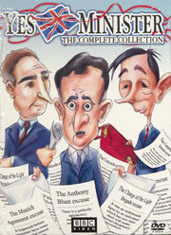|
The funniest
scenes are those in which high-ranking civil servants—full of
themselves and convinced that they represent the true government
while politicians are just temporary annoyances—seek to manipulate
the minister. As a comedy, there are obviously exaggerations, but
you can observe the exact same dynamic (sometimes even the same
situations) at the heart of the governments in Ottawa or Quebec City
to this day.
 Few people realize to what extent a minister is dependent on his
civil servants for everything. The powers of a minister are far less
impressive than many imagine. He has only a small team—his cabinet
of a dozen or so, only three or four of whom are political advisors,
and most of whom are not specialists in the issues that make up the
minister's responsibilities—to help him make many sometimes very
technical decisions, or set up extremely complex reforms. On the
other hand, thousands of civil servants have been intimately
familiar with their files for years, are masters of the legislative
machine and bureaucratic procedures, and know exactly how to pull
the strings inside an enormous State to obtain or block one thing or
another. They generally control the schedule (it's impossible to push anything forward without jumping through the necessary hoops), the "pen"
(the writing up of texts required to push any file forward), the
expertise (who can you turn to if the civil servants in your legal
department tell you it's against the law to do something, even if
you think they're wrong?), etc.
Few people realize to what extent a minister is dependent on his
civil servants for everything. The powers of a minister are far less
impressive than many imagine. He has only a small team—his cabinet
of a dozen or so, only three or four of whom are political advisors,
and most of whom are not specialists in the issues that make up the
minister's responsibilities—to help him make many sometimes very
technical decisions, or set up extremely complex reforms. On the
other hand, thousands of civil servants have been intimately
familiar with their files for years, are masters of the legislative
machine and bureaucratic procedures, and know exactly how to pull
the strings inside an enormous State to obtain or block one thing or
another. They generally control the schedule (it's impossible to push anything forward without jumping through the necessary hoops), the "pen"
(the writing up of texts required to push any file forward), the
expertise (who can you turn to if the civil servants in your legal
department tell you it's against the law to do something, even if
you think they're wrong?), etc.
A minister who wants to
accomplish anything at all in a direction that does not please the
bureaucracy has to get up pretty early in the morning, pull out all
the stops, and have a strong team with an extremely well-developed
sense of strategy. It's almost like a game of chess. Not that the
minister's own civil servants are the only obstacles to overcome:
there's the Privy Council Office (the Conseil exécutif in Quebec),
the State's central bureaucratic organ; the Prime Minister's Office,
which has the ultimate say on everything; the other ministers; the
caucus; and well-connected lobbyists.
But how is it,
some will wonder, that civil servants can block anything? Are they
not simply subordinates in charge of implementing political
decisions? Yes and no. In fact, they have their own power, and they
use it, even if it's in a roundabout way. There are some classic
tricks that are still constantly being used in our capitals today.
In the TV series, Hacker asks his civil servants, for example, to
formulate a proposition in a certain manner in a document that is to
be presented to cabinet. The document comes back with a formulation
that corresponds rather to Sir Humphrey's position. The minister
sends the document back, asking for modifications. The document
comes back with changes that still do not correspond to the wishes
of the minister, who proceeds to send it back through the machine
again, until at last, discouraged, he decides to try to write it up
himself to his own liking, a task which is obviously more
complicated than he had envisioned.
I would add, from my own
personal experience, that this little game can get even more
complicated when there is a hard and fast schedule to respect (for
example, an important cabinet meeting at which a decision will have
to be made if the whole project is not to be delayed by several
months). Note that civil servants do not engage in direct
insubordination, which they could not do without calling the whole
democratic system into question. They never tell the minister
directly, "We don't care about your position; you're just an
insignificant elected official, and we're the ones with the real
power here." But that is nevertheless how they act, albeit in a more
subtle manner. The minister cannot simply command his civil servants
to do this or that by snapping his fingers. He, too, must play the
game and try to "outsmart" those who are opposed to his reform.
Conversely, if—as also obviously happens—the department's bureaucracy
is rather in favour of the minister's position, then the reform can
proceed much more smoothly.
|

